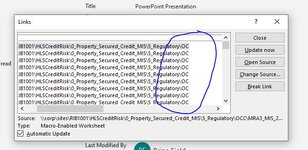BuJay
Board Regular
- Joined
- Jun 24, 2020
- Messages
- 75
- Office Version
- 365
- 2019
- 2016
- 2013
- Platform
- Windows
I have a bunch of charts linked to excel from within powerpoint.
Can someone provide a macro that would list out the full addresses of each linked object, i.e., all of the source addresses? Printing to the immediate window is sufficient - I am just thinking that there is an improperly linked object somewhere and cannot expand the address string in the powerpoint edit links window. (See image)
Can someone provide a macro that would list out the full addresses of each linked object, i.e., all of the source addresses? Printing to the immediate window is sufficient - I am just thinking that there is an improperly linked object somewhere and cannot expand the address string in the powerpoint edit links window. (See image)






